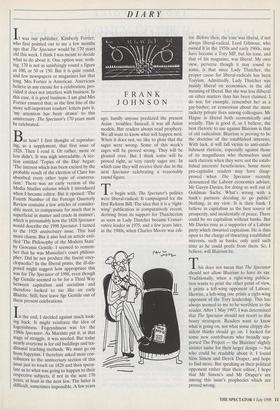DIARY
FRANK JOHNSON But how? I first thought of reproduc- ing, as a supplement, that first issue of 1828. Then I read it. Or rather, more or less didn't. It was nigh unreadable. A sec- tion entitled 'Topics of the Day' began: `The interest which has been excited by the probable result of the election of Clare has absorbed every other topic of conversa- tion.' There was an early version of the Media Studies column which I introduced when I became editor. But it opened: 'The Fourth Number of the Foreign Quarterly Review contains a few articles of consider- able merit, to compensate for much that is superficial in matter and crude in manner', which is presumably how the 1828 Spectator would describe the 1998 Spectator. I turned to the 1928 anniversary issue. This had more charm. But it also had an article enti- tled 'The Philosophy of the Modern State' by Giovanni Gentile. I seemed to remem- ber that he was Mussolini's court philoso- pher. Did he not produce the fascist ency- clopaedia? In the liberal prints, the ill-dis- posed might suggest how appropriate this was for The Spectator of 1998, even though Sgr Gentile seemed to be for a Third Way between capitalism and • socialism and therefore looked to me like an early Blairite. Still, best leave Sgr Gentile out of these present celebrations.
In the end, I decided against much look- ing back. It might reinforce the idea of fogeyishness. Fogeyishness was for the 1980s Spectator. As Marxists put it, at that stage of struggle, it was needed. But today nearly everyone is for old buildings and tra- ditional teaching methods. We must go on from fogeyism. I therefore asked most con- tributors to the anniversary section of this issue just to touch on 1828 and then specu- late as to what was going to happen to their respective subjects, if not in the next 170 years, at least in the next few. The latter is difficult, sometimes impossible. A few years ago, hardly anyone predicted the present Asian troubles. Instead, it was all Asian models. But readers always read prophecy. We all want to know what will happen next. When it does not, we like to gloat that the sages were wrong. Some of this week's sages will be proved wrong. They will be gloated over. But I think some will be proved right, as very rarely sages are. In which case they will receive their due in the next Spectator celebrating a reasonably round figure.
To begin with, The Spectator's politics were liberal-radical. It campaigned for the first Reform Bill. The idea that it is a 'right- wing' publication is comparatively recent, deriving from its support for Thatcherism as soon as Lady Thatcher became Conser- vative leader in 1975, and a few years later, in the 1980s, when Charles Moore was edi- tor. Before then, the tone was liberal, if not always liberal-radical. Lord Gilmour, who owned it in the 1950s and early 1960s, may have become a Tory MP, but his tone, and that of his magazine, was liberal. My own view, perverse though it may sound to some, is that since Lady Thatcher, the proper cause for liberal-radicals has been Toryism. Admittedly, Lady Thatcher was mainly liberal on economics, in the old meaning of liberal. But she was less illiberal on other matters than has been claimed. I do not, for example, remember her as a gay-basher, or censorious about the more rackety private lives among colleagues. Mr Hague is liberal both economically and socially. This is good if, as I believe, the best rhetoric to use against Blairism is that of old radicalism. Blairism is proving to be the doctrine of the established interests. With luck, it will fall victim to anti-estab- lishment rhetoric, especially against those of its magnificoes who themselves used such rhetoric when they were not the estab- lished interests' beneficiaries. Some more pro-capitalist readers may have disap- proved when The Spectator recently denounced the Labour economics adviser, Mr Gavyn Davies, for doing so well out of Goldman Sachs. What's wrong with a bank's partners deciding to go public? Nothing, in my view. It is their bank. I believe in capitalism as the best source of prosperity, and incidentally of peace. There could be no capitalism without banks. But Mr Davies rose as a supporter of a Labour party which thwarted capitalism. He is thus open to the charge of thwarting established interests, such as banks, only until such time as he could profit from them. So, I believe, will Blairism be.
This does not mean that The Spectator should not allow Blairism to have its say. Traditionally, when a right-wing publica- tion wants to print the other point of view, it prints a left-wing opponent of Labour; likewise, a left-wing one prints a right-wing opponent of the Tory leadership. This has always seemed to me to be worthless to the reader. After 1 May 1997, I was determined that The Spectator should not resort to this hoary stratagem. Readers want to know what is going on, not what some chippy dis- sident thinks should go on. I looked for some new contributors who broadly sup- ported The Project — the Blairites' slightly sinister name for their larger design — but who could be readable about it. I found Sion Simon and Derek Draper, and hope to find more. But speaking as their political opponent rather than their editor, I hope that Mr Simon's and Mr Draper's are among this issue's prophecies which are proved wrong.














































































































 Previous page
Previous page